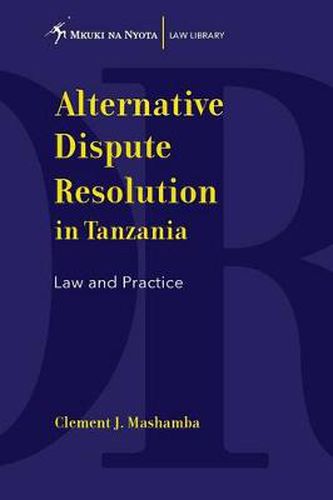Alternative Dispute Resolution in Tanzania. Law and Practice
Clement J Mashamba

Alternative Dispute Resolution in Tanzania. Law and Practice
Clement J Mashamba
This title is printed to order. This book may have been self-published. If so, we cannot guarantee the quality of the content. In the main most books will have gone through the editing process however some may not. We therefore suggest that you be aware of this before ordering this book. If in doubt check either the author or publisher’s details as we are unable to accept any returns unless they are faulty. Please contact us if you have any questions.
Today, Alternative Dispute Resolution (ADR) has gained international recognition and is widely used to complement the conventional methods of resolving disputes through courts of law. ADR simply entails all modes of dispute settlement/resolution other than the traditional approaches of dispute settlement through courts of law. Mainly, these modes are: negotiation, mediation, [re]conciliation, and arbitration. The modern ADR movement began in the United States as a result of two main concerns for reforming the American justice system: the need for better-quality processes and outcomes in the judicial system; and the need for efficiency of justice. ADR was transplanted into the African legal systems in the 1980s and 1990s as a result of the liberalization of the African economies, which was accompanied by such conditionalities as reform of the justice and legal sectors, under the Structural Adjustment Programmes. However, most of the methods of ADR that are promoted for inclusion in African justice systems are similar to pre-colonial African dispute settlement mechanisms that encouraged restoration of harmony and social bonds in the justice system. In Tanzania ADR was introduced in 1994 through Government Notice No. 422, which amended the First Schedule to the Civil Procedure Code Act (1966), and it is now an inherent component of the country’s legal system. In recognition of its importance in civil litigation in Tanzania, ADR has been made a compulsory subject in higher learning/training institutions for lawyers. This handbook provides theories, principles, examples of practice, and materials relating to ADR in Tanzania and is therefore an essential resource for practicing lawyers as well as law students with an interest in Tanzania. It also contains additional information on evolving standards in international commercial arbitration, which are very useful to legal practitioners and law students.
This item is not currently in-stock. It can be ordered online and is expected to ship in 7-14 days
Our stock data is updated periodically, and availability may change throughout the day for in-demand items. Please call the relevant shop for the most current stock information. Prices are subject to change without notice.
Sign in or become a Readings Member to add this title to a wishlist.


